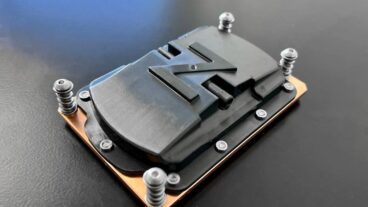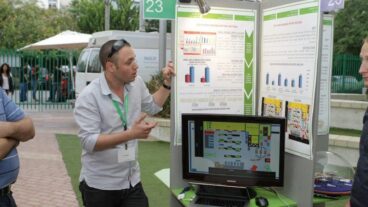An Israeli biopharmaceutical start-up is developing a treatment for cancer patients designed to harness the power of the patient’s immune system in order to destroy cancer cells in the body.
The potentially revolutionary immunotherapy drug, developed by Shoham-based company Immunovative Therapies, incorporates living immune cells as the active ingredient in the treatment, stimulating the body’s own immune system to fight the tumor. The drug, AlloStim, has already been successfully tested in animal trials, and Phase I/II clinical trials on patients with advanced blood cancer will begin at the end of this year, or the start of 2008.
Cancer is a growing problem worldwide. Over recent decades, the incidence of cancer has escalated dramatically, now striking nearly one in two men, and more than one in three women. In the US alone, 1.2 million people are diagnosed with cancer every year, and half of them die as a result of the disease. The National Cancer Institute estimates that the number of cancer cases will increase further as the population ages.
“The battle against cancer is a battle we are losing,” admits Michael Har-Noy, founder and CEO of Immunovative Therapies. But he hopes to be part of the change in the battle techniques being employed by doctors.
Despite dramatic advances in medicine, conventional cancer therapies – surgery, radiation and chemotherapy – remain much the same today as they have for decades. All three are drastic treatments, and both radiation and chemotherapy affect normal cells causing severe side effects. The major limitation of these therapies is their inability to eliminate the last tumor cell. Any remaining cells proliferate and cause a relapse. These new cells are often resistant to chemotherapy/radiation treatments, leaving the patient with what can be an untreatable disease.
Immunotherapy is a new form of treatment that researchers have been investigating for the last two decades. It uses the human immune system to seek out and destroy cancer cells wherever they reside in the body. Initially this field of medicine was considered one of the most promising potential treatments for cancer because it seemed to offer up the hope of getting rid of every single tumor cell. Animal trials went well, but when the new treatments reached human trials they inevitably failed.
“The problem was that it was easier to train a mouse’s immune system to fight a tumor, than to train the human immune system,” Har-Noy told ISRAEL21c. “Tumors in humans seem to have evolved a very sophisticated mechanism to avoid an immune attack.”
With this in mind Har-Noy, who had been working in the field of immunotherapy in California for over 20 years, decided to try an alternative approach. He began researching bone marrow transplants (BMT), the one area of medicine where it has been proven that the immune system can cure patients of cancer.
With BMT, which is used to treat blood cancer, immune T-cells from a tissue-matched donor are transplanted into the patient. These transplanted immune cells kill the tumor cells, overcoming the tumor’s immunoavoidance mechanisms, in what is known as the ‘graft vs. tumor’ effect. The result is the complete eradication of cancer, even in cases where patients had large tumors that were unresponsive to other cancer treatments.
While this can cure the patient, in 50% of cases, the new immune cells cause a serious and sometimes fatal side effect known as graft vs. host disease (GVHD), when the transplanted immune cells recognize both normal and tumor cells as foreign and mount attacks against both indiscriminately.
Har-Noy began looking for a treatment that would create the same anti-tumor effect of the BMT, without any of the toxic side effects. After three years of development, this is exactly what Immunovative believes it has achieved.
The company’s new treatment, which can be used for virtually any type of cancer, works in two ways, firstly – like BMT – it disables the ability of the tumor to fight the immune response, and secondly it trains the patient’s immune system to kill the cancer cells wherever it finds them.
The company takes T-cells from a normal donor and produces them ex-vivo in a nine-day proprietary culture process in a bioreactor. There is no need to match the donor to the recipient as required in BMT procedures. The AlloStim product is an intentional mismatch to the recipient. In the bioreactor the cells are activated with monoclonal antibody-coated particles that are removed before they are given to the patient.
“We provoke these cells, so that they become very ‘angry’ immune cells that are highly stimulated,” explains Har-Noy. “Then we infuse them into the patient. The patient’s immune system sees these new ‘angry’ cells as a great danger to the body, and rallies to the defense to eliminate the threat, releasing an array of inflammatory cytokines, in what is a bit like the fight or flight response of adrenaline.”
These inflammatory cytokines, which remain in the body for between 24-36 hours, shut down the ability of the tumor to avoid an immune attack and at the same time enable immune-mediated killing of tumors spread throughout the body.
In the wake of this treatment, even if cancer cells recur in the body, the immune system can destroy them and does so automatically in much the same way that vaccines work. If a patient is treated for breast cancer, for example, and breast cancer cells begin to grow again after a few years, the immune system destroys them immediately. If the patient develops an alternative type of cancer, such as lung cancer, however, the AlloStim treatment will have to be repeated for that new type of cancer.
Patients who undergo the AlloStim treatment are not expected to suffer any side effects due to what the company calls the ‘Mirror Effect’. The T-cells infused into a patient do not attack the patient’s immune system, but stimulate it to attack the tumor. This is known as the host vs tumor (HVT) effect, and is the mirror image of the GVT effect. Unlike the GVH effect, it is not toxic, representing a new concept in the treatment of cancer.
“We’ll know for sure when we treat patients, but we aren’t anticipating any kind of toxic response,” says Har-Noy.
The three-year-old company, which works from labs at Hadassah-Hebrew University Medical Center and Tel-Aviv Sourasky Medical Center, has already carried out successful animal trials on mice. “We were able to show that we could cure many types of tumors located throughout the bodies of the mice. A high percentage of the mice were cured without the GVHD side effect,” says Har-Noy.
While animal trials were also successful in immunotherapy treatments that later proved unsuccessful in humans, Har-Noy believes this is different. “We reverse engineered a new response that works in humans and just tested the principle on mice,” he explains.
The next stage is clinical trials on humans. Phase I/II clinical trials at Hadassah are expected to begin at the end of this year and will test both toxicity and efficacy at the same time. “We will be dealing with patients who suffer from incurable cancers and will be monitoring the response of the tumors to see what response the drug has,” says Har-Noy.
Initially the company plans to focus on patients with advanced blood cancer – diseases like Chronic Lymphocytic Leukemia (CLL), non-Hodgkin’s Lymphoma and Multiple Myeloma. Additional studies for advanced cancers that have metastasized to the liver, lungs, or bone, and advanced prostrate cancer are also planned for mid-2008.
The company has focused on CLL because currently there is only one approved drug to treat this disease, Campath by Ilex, and the FDA will fast-track any promising drug in this field, bringing it through testing and out to market in just 18 months.
Immunovative, which is just a small start-up with five members of staff, needs this quick approval. It will enable the company to reduce the size of its clinical studies, and cut down the length of approval time it needs to test the drug on other types of cancer. Fast track approval also brings other benefits. When Campath was approved in 2005, Ilex was acquired by Gensyme for $1 billion.
In the first trial, the company plans to test 25 patients over a period of about six months. If the clinical trials go well, they will be expanded to the US.
“We can’t wait to see how it really works in patients,” says Har-Noy enthusiastically. “It has such huge potential. Our collaborators at Hadassah also want to bring it to patients as soon as possible.”
Har-Noy founded Immunovative at the Misgav incubator in May 2004 when he emigrated from San Diego specifically to set up the company. Har-Noy had previously set up two other companies specializing in developing cell-based immunotherapies, Medcell and Biovest International, which is still operating.
“I was involved in a lot of things that didn’t work,” Har-Noy admits. “It was this history of failure that helped me come up with this idea. We know that immunotherapy can work. In 4-5% of patients it works dramatically. I realized that the problem in the past was that scientists were developing elegant solutions to the wrong problems. They assumed the immune system is weak, and worked to boost it, while in most cancer patients it is strong, and the problem lies with the tumor instead.”
Because of the lack of credibility in this field, it was difficult for Har-Noy to get funding in the US for what was then just a theoretical idea. When he was offered a grant of $300,000 by the Office of the Chief Scientist he jumped at the opportunity.
Immunovative left the incubator in May 2006 and raised $1.2 million from angel investors. The company is now in the midst of another fundraising round of $1m., which it plans to use to support the clinical trial program and set up a manufacturing facility in Israel.
If the clinical trials go well, Immunovative will be in from the cold, and so potentially will the field of immunotherapy. “The real launch for us will after our trials in Hadassah,” says Har-Noy. “The VCs and pharmaceutical companies have been so burned in the past that they won’t even talk to us until we bring them human data.”
Har-Noy is optimistic. “Our approach is unique. This is potentially a major breakthrough that could change the paradigm of how we treat cancer. In the early stages, we might well compete with chemotherapy. In addition, this treatment could also work in other diseases as well. In animal models we were able to show that our drug protected mice from malaria, infections in the brain, and Lupus, so it may well have implications even broader than cancer.”
A seasoned veteran, however, Har-Noy is not about to get carried away. “Every scientist believes their treatment is going to bring a Eureka moment, but I’ve had enough failures to be a little more humble. At Immunovative we have set in place a system to monitor patients at every step of the treatment. If it doesn’t work, we will know where it gets stuck, and this data will be vital to understanding what interventions are necessary to make it work. If we know what the problem is we can develop a solution. Hopefully, however, we won’t need to.”













